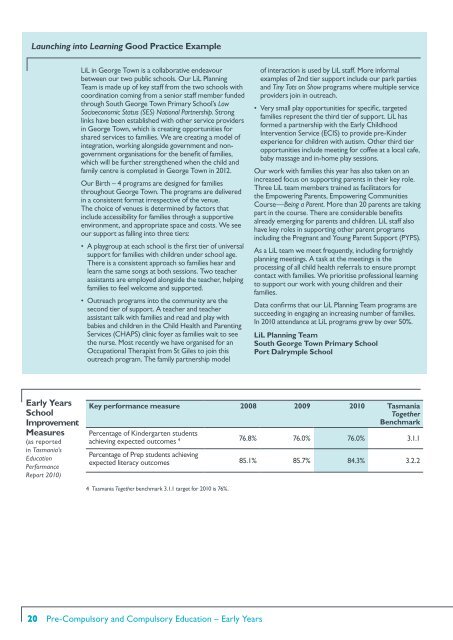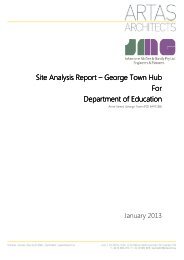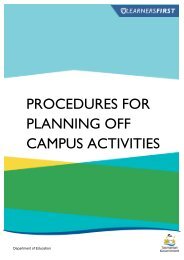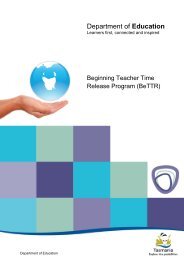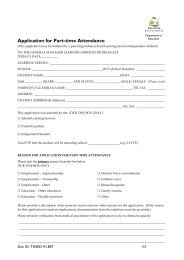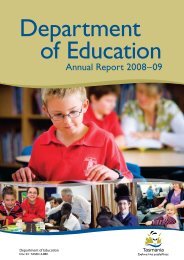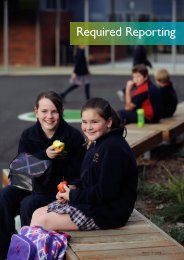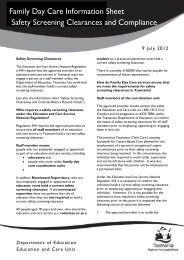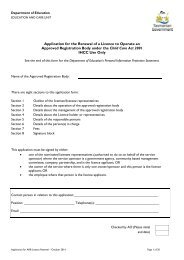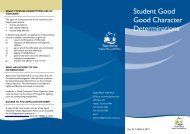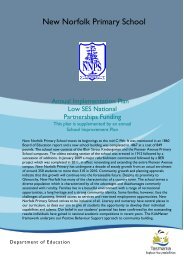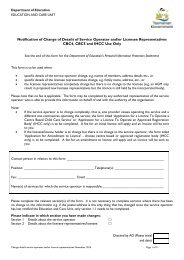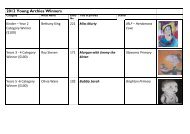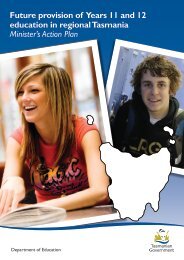Department of Education
DoE Annual Report 2010-2011 - Department of Education
DoE Annual Report 2010-2011 - Department of Education
- No tags were found...
Create successful ePaper yourself
Turn your PDF publications into a flip-book with our unique Google optimized e-Paper software.
Launching into Learning Good Practice Example<br />
LiL in George Town is a collaborative endeavour<br />
between our two public schools. Our LiL Planning<br />
Team is made up <strong>of</strong> key staff from the two schools with<br />
coordination coming from a senior staff member funded<br />
through South George Town Primary School’s Low<br />
Socioeconomic Status (SES) National Partnership. Strong<br />
links have been established with other service providers<br />
in George Town, which is creating opportunities for<br />
shared services to families. We are creating a model <strong>of</strong><br />
integration, working alongside government and nongovernment<br />
organisations for the benefit <strong>of</strong> families,<br />
which will be further strengthened when the child and<br />
family centre is completed in George Town in 2012.<br />
Our Birth – 4 programs are designed for families<br />
throughout George Town. The programs are delivered<br />
in a consistent format irrespective <strong>of</strong> the venue.<br />
The choice <strong>of</strong> venues is determined by factors that<br />
include accessibility for families through a supportive<br />
environment, and appropriate space and costs. We see<br />
our support as falling into three tiers:<br />
• A playgroup at each school is the first tier <strong>of</strong> universal<br />
support for families with children under school age.<br />
There is a consistent approach so families hear and<br />
learn the same songs at both sessions. Two teacher<br />
assistants are employed alongside the teacher, helping<br />
families to feel welcome and supported.<br />
• Outreach programs into the community are the<br />
second tier <strong>of</strong> support. A teacher and teacher<br />
assistant talk with families and read and play with<br />
babies and children in the Child Health and Parenting<br />
Services (CHAPS) clinic foyer as families wait to see<br />
the nurse. Most recently we have organised for an<br />
Occupational Therapist from St Giles to join this<br />
outreach program. The family partnership model<br />
<strong>of</strong> interaction is used by LiL staff. More informal<br />
examples <strong>of</strong> 2nd tier support include our park parties<br />
and Tiny Tots on Show programs where multiple service<br />
providers join in outreach.<br />
• Very small play opportunities for specific, targeted<br />
families represent the third tier <strong>of</strong> support. LiL has<br />
formed a partnership with the Early Childhood<br />
Intervention Service (ECIS) to provide pre-Kinder<br />
experience for children with autism. Other third tier<br />
opportunities include meeting for c<strong>of</strong>fee at a local cafe,<br />
baby massage and in-home play sessions.<br />
Our work with families this year has also taken on an<br />
increased focus on supporting parents in their key role.<br />
Three LiL team members trained as facilitators for<br />
the Empowering Parents, Empowering Communities<br />
Course—Being a Parent. More than 20 parents are taking<br />
part in the course. There are considerable benefits<br />
already emerging for parents and children. LiL staff also<br />
have key roles in supporting other parent programs<br />
including the Pregnant and Young Parent Support (PYPS).<br />
As a LiL team we meet frequently, including fortnightly<br />
planning meetings. A task at the meetings is the<br />
processing <strong>of</strong> all child health referrals to ensure prompt<br />
contact with families. We prioritise pr<strong>of</strong>essional learning<br />
to support our work with young children and their<br />
families.<br />
Data confirms that our LiL Planning Team programs are<br />
succeeding in engaging an increasing number <strong>of</strong> families.<br />
In 2010 attendance at LiL programs grew by over 50%.<br />
LiL Planning Team<br />
South George Town Primary School<br />
Port Dalrymple School<br />
Early Years<br />
School<br />
Improvement<br />
Measures<br />
(as reported<br />
in Tasmania’s<br />
<strong>Education</strong><br />
Performance<br />
Report 2010)<br />
Key performance measure 2008 2009 2010 Tasmania<br />
Together<br />
Benchmark<br />
Percentage <strong>of</strong> Kindergarten students<br />
achieving expected outcomes 4 76.8% 76.0% 76.0% 3.1.1<br />
Percentage <strong>of</strong> Prep students achieving<br />
expected literacy outcomes 85.1% 85.7% 84.3% 3.2.2<br />
4 Tasmania Together benchmark 3.1.1 target for 2010 is 76%.<br />
20<br />
Pre-Compulsory and Compulsory <strong>Education</strong> – Early Years


